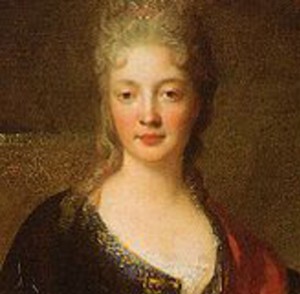Élisabeth Jacquet de la Guerre – “The Marvel of Our Century”
 In the dedication to her first collection of pieces for harpsichord in 1687, Élisabeth Jacquet de la Guerre recalled that already when she was five years old King Louis XIV had recognized in her “a disposition for playing the harpsichord.” So impressed was the Sun King that he arranged for her education and support. When Élisabeth was twelve, the Mercure Gallant, the journal of the French court, reported:
In the dedication to her first collection of pieces for harpsichord in 1687, Élisabeth Jacquet de la Guerre recalled that already when she was five years old King Louis XIV had recognized in her “a disposition for playing the harpsichord.” So impressed was the Sun King that he arranged for her education and support. When Élisabeth was twelve, the Mercure Gallant, the journal of the French court, reported:
There is a prodigy that has been appearing here in Paris for four years now. She sings the most difficult music at sight. She accompanies herself and she accompanies others to sing, on the harpsichord, which she plays in a style that cannot be imitated. She composes pieces, and she plays them in all the keys that one asks of her.
The following year, the same journal declared Élisabeth “the marvel of our century.”
Mary Cyr begins the thorough and engaging biographical essay accompanying her recent edition of Elisabeth’s complete works with the observation that “something of this sense of marvel seems to have adhered to Jacquet de la Guerre throughout her career–no doubt in part because she was a child prodigy and in part because she was an exceptional achiever in a community in which opportunities for the achievement were available mostly to men.” Cyr suggests that Élisabeth was perhaps the most successful woman in the history of French music:
She was an accomplished performer, renowned as a singer and a harpsichordist. She was a musical hostess whose in-house concerts attracted the most musically discerning Parisians and visitors to Paris. For five decades she kept herself at the center of musical life in Paris and Versailles. But she was able to expand the range of possibilities available to women: unlike other women of her day, she was a composer of music for keyboard, for violins, for voice, for chorus, and for the stage, and she actively pursued the publication of her compositions… She had sufficient stature, connections, and savoir-faire to negotiate successfully the tricky process of having an opera produced by the Accadémie royale de musique. Such a range of accomplishments would have been remarkable for anybody, regardless of gender.
The exquisite quality of the impressive body of work that has come down to us reveal a master composer and provide some glimpse of her extraordinary gift as a performer. Beyond sheer technical display, reflecting her mastery of both vocal and instrumental idioms, her music displays a refined sensitivity to the drama and character, whether in setting a text our in purely instrumental works.
Magnificat will perform Élisabeth’s musical description of the Israelites passage through the Red Sea, as well as selections from her Pieces de claveçin and Trio Sonatas in concerts on the weekend of February 4-6.